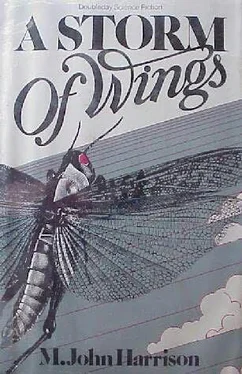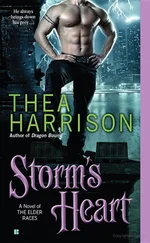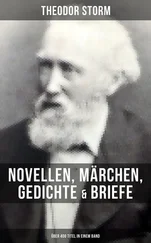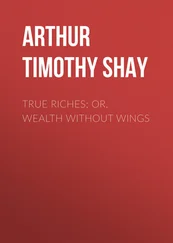'Hornwrack!'
The burning ship reminded him of some childhood ritual, some solstitial bonfire lit in the wet dark ploughland. He turned almost reluctantly from it, his face stiff with heat. Fulthor, Tomb and the old man stood a little way off; toward them across the gleaming concourse men were running. 'To you, Fulthor!'he cried, just as he might have done beneath the heights of Minnet-Saba, where the rival factions of the Low City clash without chivalry at night; and, encumbered by the madwoman, promptly dropped the unfamiliar sword. 'Black filth, girl. Let go.'The weapon tolled like a bell on the worn flagstones. His horse trod on it. A fit of coughing racked him.
As he disentangled himself, though, he realised that the mist was dwindling round him like a dream, to reveal the giant quays and boatsheds; the little town; the slatey cliffs.
Seabirds called as they skimmed the water. Even the clouds were blowing away. For all the fears of the dead sailor, nothing floated out there on the roadstead. But for the bubbling wreck on the waterstair the estuary was empty of menace, quite empty. Puzzled, he drew his knife and urged forward his horse.
7: Saint Elmo Bujfin and the Navigators of Iron Chine
With the mist dispersed the village smelt of smoked fish and salt. Fulthor and his party stood outnumbered and uncertain at the centre of an unarmed crowd. Hornwrack had put up his knife. Like the survivors of some forgotten colonial war (desultory, expedient, never quite resolved) the occupants of Iron Chine drew round him: thin intelligent women, a few bare-limbed children. There were no young men present, only some old ones who stamped their feet and turned up their heavy collars, faded blue eyes watering in the cold wind. They stared up at him with a defiant incuriosity and he stared back embarrassed, although he could not have said precisely why. It was a mixed community; at the periphery of the crowd a handful of the Reborn hovered like strange, long-necked animals, their delicate features coarsened a little by an unrelenting deprivation. What had they left behind them in the Afternoon, what mad sophistications exchanged for the smell of dead fish?
A few sailors who had escaped the wreck now swam ashore.
No-one offered them any help; nor did they seem to expect it, but pulled themselves up on to the quay and sprawled there with the blind, open-mouthed look of the exhausted. After a moment two of them got up again and between them pulled out a third. He kept trying to thank them. They knelt by his atrociously burnt head until a trickle of clear fluid ran out of the corner of his mouth; then they left him to stare sightlessly at a flock of gulls tearing pieces off something out on the estuary. They were yellow-haired, guileless, hardly more than children, but their faces were full of despair, as if they had fought a lifetime of holding actions and unplanned retreats. Alstath Fulthor observed them gravely for a minute or two then, finding no other authority and extricating himself with difficulty from the civilian crowd, presented them with his safe conducts.
'Our mission is one of importance,'he told them.
Eventually one of them said, 'This was not the time to come here.'He turned his back and, quietly dismissing the intrusion, vomited up a quantity of seawater. His companion put a placatory hand on his shoulder and reminded him,
'Captain, they come from the capital -'
But he only wiped his mouth and laughed wildly. 'Ay, and look at them! Some yellow old man, and a woman. Two city lordlings and their dwarf!'
A fit of dry retching shook him. 'There will never be any help from Viriconium,'he said indistinctly. There was self-pity in his voice, and after a moment or two he acknowledged it with a disgusted twist of his mouth. 'Did you see anything out there?'he asked; and when the other shook his head, whispered, 'I pity those that did.'
He tried to squeeze the salt water from his hair.
'One of our own vessels rammed us, that's certain,'he continued thoughtfully. 'But by then we were already burning.'
He shrugged.
'It was as usual. Those who saw anything were struck mad immediately. Those who did not got lost in the mist.'
Thus the defeated, locked in their dreams of defeat.
'You are bound to help us!'shouted Alstath Fulthor suddenly.
'Leave them alone, Fulthor,'advised Hornwrack. Often enough he had been among the defeated himself. His sudden compassion surprised him nevertheless; and that he should recognise it as such surprised him even further. He looked sidelong at Tomb the Dwarf to see if he had noticed anything, but the dwarf wasn't interested – he only grinned pleasantly and unforgivingly down at the sailors and said, 'There is no enemy in sight now.'
'They are bound by those signatures to help us,'said the Reborn Man less loudly.
They regarded him with puzzlement, and some scorn.
'Go up to the new hall,'was all they said, 'and leave us alone.'And they wandered off along the quay to where the remaining mast of the foundered ship poked up at a strange angle from a scum of floating wreckage. There a smell of lemons clung, as if some bitter dew had condensed on that doomed hull during its confused final voyage. It was an unearthly, chemical smell. The horses hated it.
The crowd, sensing a termination, looked on emptily for a minute or two, then began to disperse – the children drawn by a kind of magnetism toward the wreck while their elders took to the cobbled road which wound up into Iron Chine proper, where they vanished in twos and threes among the little two-storey houses with the wet slate roofs, the drying nets and lines of flaccid laundry. Dulled by the cold and continual privation, they seemed unable to react to a tragedy which, -as someone in Fulthor's party pointed out later, must have involved them all. One woman did stand for a time staring out into the estuary, a few tears drying on her cheeks in the wind. Only then did Hornwrack realise that more than one vessel had been involved. A spatter of rain blew out of the west (where like a great ancient fish there lay in wait the island continent of Fenlen) and into his face. He could see the 'new hall'on a rise above the village. He felt wretched.
'This wind is prising my joints apart,'said Cellur the birdmaker cheerfully. When no-one answered him he gave an impatient shrug. 'These people need more help than they could ever give us,'he told Fulthor. 'When you stop sulking you will see that.'
It came on to rain in earnest as they passed through the Chine. The peeling walls had once been gaily whitewashed, the window-boxes tended; now pale faces observed them from behind the streaming windows. Higher, they found they could look down into the boatyards of St Elmo Buffin, from which rose the masts and spars of his white and fated fleet – rakish three-hulled craft fitted with those peculiar slatted metal sails over which rioted orange lizards, green beetles glowing like fresh tattoos, and subtly distorted geometrical figures. Designed by the Afternoon, built by the Evening, blessed by a new madness of both, they were arming for some invisible war. 'DEATH'proclaimed one sail, and 'LIFE'another, in calligraphies rich and outlandish; while on the decks beneath shipwrights and sailors swarmed like rats.
'No hint of this war has ever come to us in the High City,'said Alstath Fulthor wonderingly. 'It is no wonder they are poverty stricken here.'
Higher still the 'new hall'hung above them like a threat. Sombre, columnar, mysterious of purpose, it had about it a most appalling air of age, an age which emptied out the cultural luggage of Alstath Fulthor's vanished race – all the moral atrocities and philosophical absurdities and expired technologies – and found it meaningless; rendering meaningless in the end even the deserts which were their only legacy to the Evening. As he approached it, wincing from the weather, huddling into his cloak against a wind a million years old, it spoke to Galen Hornwrack from an age fully as naive but by no means as puzzled as his own. It was a survivor of the Morning.
Читать дальше












